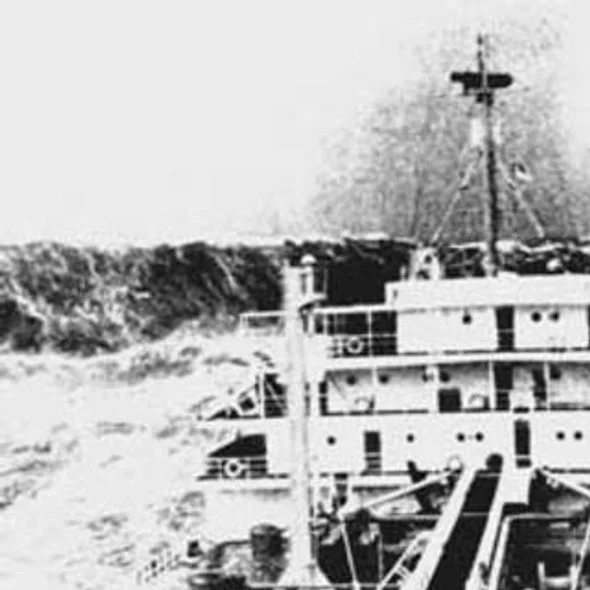Prepare to be boarded! We are met by the Coast Guard off the coast of the U.S. Notice the difference between the partially open pilothouse doors and the tinted window. I much prefer seeing the real world outside, where colors are crisper, and a sunny day on the water feels good.
Thankfully, I did not spent time in Seattle this past winter, where they broke records for the number of rainy days and inches of rain since record keeping began in 1895. I so wish my friends in the Pacific Northwest some sunny days and glorious weather soon!
For the past week in Annapolis, we have had our share of rainy days, and it is downright depressing...and eye opening. Get on Route 50 to drive into Washington, joining the steady wave of cars and trucks pushing through the wet cloud of rain and spray, you can't help but notice the odd vehicle with its wipers on but headlights off. Apparently the driver does not realize just how invisible the car is in the constant spray of water blanketing the moving traffic. Put a gray minivan in that mix and on goes the Vulcan cloaking device.
I've noticed a curious thing about these vehicles. More than a few of them have dark, tinted windows, too dark, in fact, to see inside. The drivers of those cars don't realize the dark windows affect how they perceive the outside conditions, and puts them in a poor state of situational awareness. It scares me to see drivers who are that disconnected to what they are doing, made worse when he or she puts on parking lights instead of headlights as they travel within a group of vehicles traveling at highway speeds way too close together. No wonder we have major accidents when the weather turns sour.
Traveling on a boat is much the same, in my mind. For whatever reason, people seem to think having a dark tint on the boat's windows is a good thing. Yes, it may cut down the glare of the sun, and perhaps offer some degree of privacy, but when under way, I hate it.
I looked through my photo archives for images taken of the waves from a boat's saloon as we motor along. I could not find any, and I know why. In my memory, I can't recall ever spending much off-watch day time in a saloon, as it is not a very pleasant place to be. I read in my notes from several multi-day passages that everyone who is awake is in the pilothouse, and mainly because the windows are clear glass and show the world outside as it is. Even if they don't want to interact with those on watch and simply read a book, it is just nicer in the pilothouse. Crossing a pretty stretch of ocean with fabulous colors and skies is all but lost when viewed through a darkly tinted window. Especially after a period of difficult weather, hundreds of miles offshore, or even within sight of land, I find that any level of tint, by no means severe, adds an ominous feel to the outside world: bleak, hostile, colorless.
Enjoying quiet time in the pilothouse, away from those on watch, even though the saloon has a couple of wonderful Ekornes Stressless recliner chairs. Unless the saloon door to the cockpit is open, she'd rather be up here.
When I think back to recent trips of the last five years, I recall that crew almost never sat in the otherwise comfortable saloon during the day for this reason, choosing instead the friendlier atmosphere of the clear pilothouse windows. It did not matter whether it was a Nordhavn, Krogen, Outer Reef, Fleming, or whatever. It just doesn't matter what kind of boat it is. I think people just prefer being around a bright day, with the blue colors of the water, reinforcing why they are there in the first place, especially after a passing squall or thunderstorm. A darker mood only continues when you are elsewhere on the boat. Like wearing sunglasses in an art gallery.
Even off-watch crew tend to congregate in the pilothouse, preferring the sunny view with bright colors of the sea and wildlife over the dingy view out tinted windows elsewhere on the boat.
I know there are valid reasons for tinted windows, so no one need explain that to me. Yes, protecting the varnished teak interior and fabrics from harsh sunlight is a good thing, and the greenhouse effect can raise interior temperatures in the tropics. But today aren't there other ways to satisfy those requirements? Isn't there new technology that can manage UV protection but also offer some degree of shading or reflective control when it is not needed?
Something to research... Perhaps my next boat will have a different interior treatment to manage it differently, so we can stay bright and positive no matter where we are on the boat.











